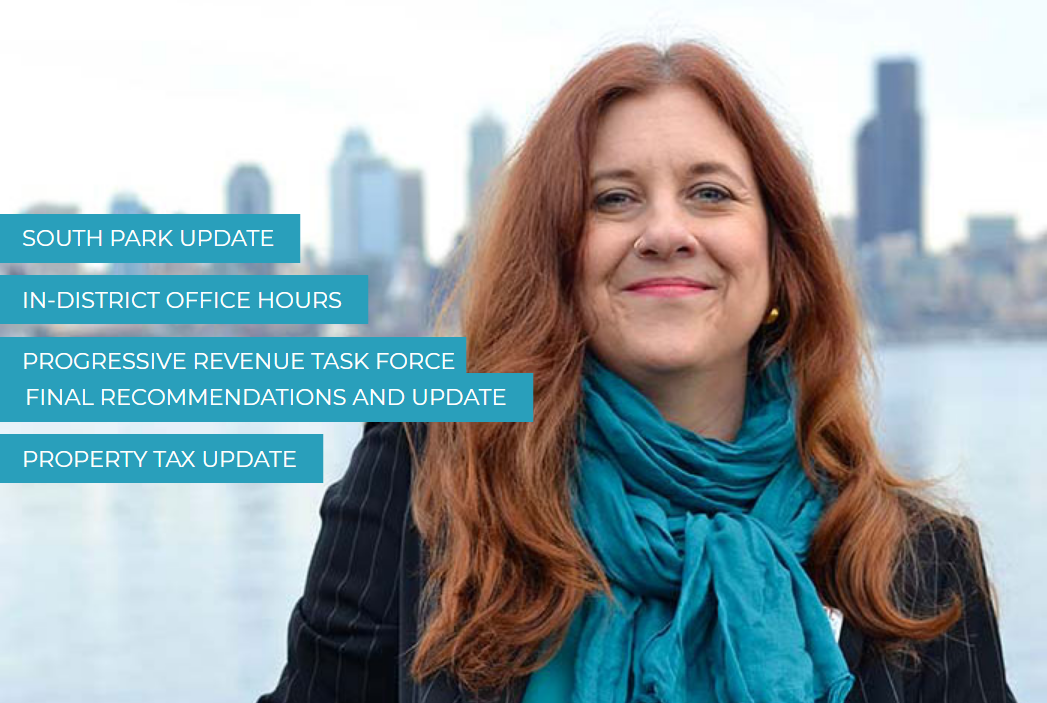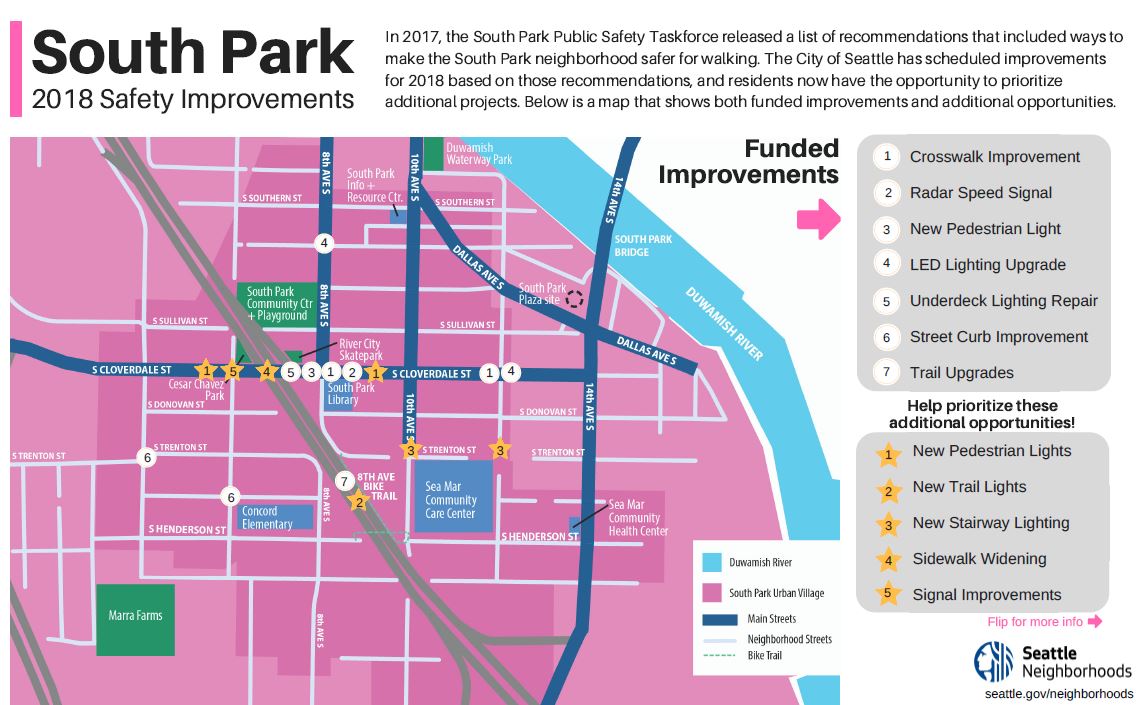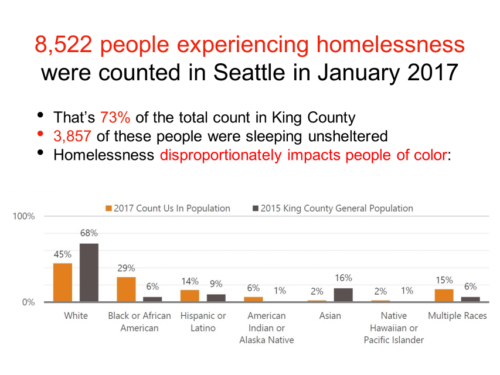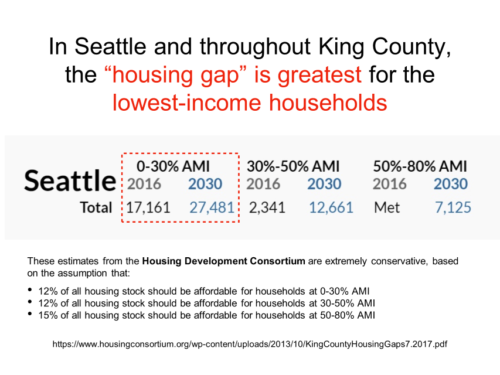South Park Update; In-District Office Hours; Progressive Revenue Task Force Final Recommendations; Property Tax Update
Here’s an update on implementation of recommendations of the South Park Public Safety Task Force, most recently discussed here. Below are updates on public safety, lighting, parks and transportation.
The Public Safety Coordinator position seeking bids from community based organizations who will then hire and supervise a city-funded public safety coordinator for South Park was released in late February; the deadline for responses closed on February 28. Notification of the award should be completed today, with a contact completed by March 30th.
This City Light map shows where additional lighting improvement have been made, over the last few weeks, in particular, the location of new streetlights to be installed in the alley between Cloverdale and Donovan, and 8th and 14th, and in the alley between Cloverdale and Sullivan between adjacent to 12th. Here’s a detailed engineering map for the alley streetlights. SDOT approved the installation of the alley lights earlier this week.
The Recreation Program Specialist position for the South Park Community Center focused on youth recreation is posted on the City’s job opportunities page, and open for applications through March 27 at 4 p.m. After hire of this permanent position, the Parks and Recreation Department will be working with youth in the area to identify and design new youth recreation programs. I have requested the Teen Late Night Program, currently operating only on Friday nights, to be expanded to Saturday nights. I’m looking forward to hearing back from the Executive about my request.
For the $500,000 in Transportation Improvements funded by the Council, the Department of Neighborhoods (DON) has begun a community process to prioritize funds based on recommendations from the South Park Public Safety Taskforce.
Here’s a link to a map showing where improvements are taking place for crosswalks, radar speed signals, a new pedestrian light, LED lighting upgrade, street curb improvements, and trail upgrades. Also included are the locations of five potential new transportation improvements, and how to help prioritizing the $500,000 for those projects the Council approved in the 2018 budget.
The map is also available in Spanish, and in Vietnamese. DON has developed paper voting ballots for the prioritization of transportation projects in Spanish and Vietnamese as well.
DON is conducting outreach in the South Park community throughout the months of March and April. DON has confirmed the following direct outreach opportunities:
- Concord PTA Meeting on 3/8 (12 residents attended)
- Seattle Parks and Recreation event at the Community Center on 3/9 (100+ residents attended)
- South Park Neighborhood Association on 3/13 (20 residents attended)
- South Park Neighborhood Information and Resource Center on 3/14
- Senior Center Community Conversation on 3/14
- Duwamish Valley Youth Corps meeting on 3/15
- Duwamish Safe Streets on 3/20
- South Park Community Center Easter Egg Hunt on 3/31
- South Park Arts on 4/9
- Concord PTA Meeting for Spanish speaking families on 4/19
- Duwamish Valley Youth Corps meeting on 4/26
DON will be hosting office hours in South Park throughout the months of March and April. DON will be available at:
- South Park Library Branch on 3/21, 4/3 , and 4/17
- South Park Community Center on 3/30, 4/6, and 4/20
- Via Vaddi Caffe on 4/9 and 4/23
As many of you know, Seattle Parks and Recreation has also been working on a renovation to the South Park Community Center, last Friday they presented to the community the final plan which they came to after receiving community input through and online survey that I previously sent out and at the Duwamish River Festival. Here’s a link to the final site wide plan.
Work is also taking place on two projects through the Neighborhood Matching Fund for the 5th and Cloverdale streetscape design, and Duwamish Waterway Park Improvements Phase 2.
Thank you to the Department of Neighborhoods for stepping up and coordinating City work in South Park, and to SDOT, Parks and City Light for their work in the South Park Community. Here’s a link to an update on DON sent me about implementation of the South Park Public Safety Task Force recommendations on Wednesday, March 14.
In-District Office Hours
On March 30, I will be at the Southwest Neighborhood Service Center (2801 SW Thistle St) from 2:00p.m. – 6:45p.m. Please be sure to arrive no later than 6:30 pm, the final meeting of the day will begin at 6:30 p.m.
These hours are walk-in friendly, but if you would like to let me know you’re coming in advance you can email my scheduler Alex Clardy (alex.clardy@seattle.gov).
Additionally, here is a list of my tentatively scheduled office hours. These are subject to change.
Friday, April 27, 2018
South Park Community Center, 8319 8th Avenue S
Friday, May 25, 2018
Senior Center of West Seattle, 4217 SW Oregon St
Friday, June 15, 2018
South Park Community Center, 8319 8th Avenue S
Friday, July 27, 2018
Southwest Neighborhood Service Center, 2801 SW Thistle St
Friday, August 17, 2018
Senior Center of West Seattle, 4217 SW Oregon St
Friday, September 21, 2018
South Park Community Center, 8319 8th Avenue S
Friday, October 26, 2018
Southwest Neighborhood Service Center, 2801 SW Thistle St
Friday, December 14, 2018
South Park Community Center, 8319 8th Avenue S
Progressive Revenue Task Force Final Recommendations
On March 9, 2018 the Progressive Revenue Task Force released their final recommendations. Before I get into the background I want to address a couple of concerns I’ve heard:
- How many businesses would pay the tax? With an eligibility threshold of $10 million in gross business revenues, according to Council Central Staff’s initial estimates, it’s anticipated that approximately only 5% of Seattle businesses would be expected to pay the tax.
- Who represented business on the tax force? The 17 member task force was composed of a number of service providers, 1 business representative who would be eligible to pay the EHT, 2 medium to small businesses, and 1 very small business.
- What is the spending plan for the revenue? Roughly speaking, the spending plan is to use 80% of revenues to build permanent housing. Options for use of revenue are found in Appendix E. Just like the Council does for any dedicated revenue, we will develop a more detailed, multi-year spending plan that will accompany the legislation.
In 2017, the City Council considered a 2018 Budget proposal to implement a $100/FTE employee hours tax to generate $25 million a year in revenue to address the city’s homelessness crisis. Ultimately, the proposal was not included in the 2018 Budget. Citing the need for more time and engagement with service providers, Seattle businesses and the community at large, the Council unanimously passed Resolution 31782. The resolution established “a process by which the City of Seattle will determine new progressive revenues including an Employee Hours Tax (EHT), expressing the City Council’s intent to impose such potential revenues, and expressing the City Council’s intent to make investments with these revenues that would assist people who are homeless or at a high risk of becoming homeless in obtaining and retaining stable housing.” Additionally, the resolution outlined considerations for task force membership, a set of principles the task force should consider when drafting their recommendations and asked the task force to consider an EHT “between $25 million and $75 million.”
The task force was formed in late 2017 and held their first meeting on January 4, 2018. Councilmember Gonzalez and I were members and co-chairs of this effort, joined by 2 additional community co-chairs. Over the course of 2 and a half months the task force met both as a full group and in a number of working groups. You can watch video of the task force meeting at the Progressive Revenue Task Force webpage.
Passed unanimously, the recommendations begin with a set of principles agreed to by the task force:
- There is an urgent need for fiscal discipline;
- Tax burdens should not be increased lightly;
- Despite the economic prosperity driving growth in the City’s revenues, and in part because of it, Seattle is facing a homelessness crisis of unprecedented proportions (emphasis added, citation 2018 Proposed Budget Executive Summary, page 2);
- Homelessness in Seattle is a crisis that must be resolved, in all of our interests;
- Resolving homelessness in Seattle cannot be accomplished, even applying fiscal discipline, without substantial new revenue; and
- When seeking new revenue, it is undesirable to rely any more heavily on property or sales taxes.
On any given night in Seattle, in addition to the 4,619 people in shelter or transitional housing programs, there are 3,857 people living unsheltered in our community. To address this need the task force recommended $150 million in new progressive revenues be collected annually. The task force recommends that half of this revenue be generated through a $75 million per year EHT and recognizes that this is a significant amount of revenue and will make an appreciable impact but will still need to be matched with additional revenue, hopefully revenue generated from recommendations coming out of the regional approach referred to as One Table.
Appendix A of the report begins to address what it would take to close Seattle’s Low-Income Housing Gap. The Appendix outlines that even with the nearly 6,000 affordable units that are anticipated to be generated through the Mandatory Housing Affordability program, Seattle still needs 21,000 additional units in the next 10-12 years. It is anticipated that Seattle will need hundreds of millions of dollars a year in order to meet this need.
While the task force didn’t recommend a specific way to structure the tax they did lay out three options for the City Council to consider. Again, as mentioned above, according to Council Central Staff’s initial analysis, it’s anticipated that only approximately 5% of Seattle businesses would be expected to pay the tax. Because the B&O tax has a lot of regressivity built into its structure, the task force tried to build in as much progressivity as possible. Option 1 below, built on a percentage of payroll, rather than a cost per employee hour, recognizes that some high grossing businesses, due to high labor costs, have very narrow profit margins:
Option 1:
$10 million per year gross revenue exemption threshold
- Firms with 1-100 FTE employees pay 0.25% of all payroll (avg. $0.078/hr)
- Firms with 101-500 FTE employees pay 0.50% of all payroll (avg. $0.156/hr)
- Firms with 501+ FTE employees pay 0.75% of all payroll (avg. $0.234/hr)
- Firms with gross revenue between $500,000 and $10 million pay $395/year
Option 2:
$8 million per year gross revenue exemption threshold
- Firms with 1-500 FTE employees pay $200/FTE/year ($0.104/hr)
- Firms with 501+ FTE employees pay $450/FTE/year ($0.234/hr)
- Firms with gross revenue between $500,000 and $8 million pay $395/year
Option 3:
$8 million per year gross revenue exemption threshold
- Firms with 1-500 FTE employees pay $140/FTE/year + 0.1% of all payroll
- Firms with 501+ FTE employees pay $300/FTE/year + 0.25% of all payroll
- Firms with gross revenue between $500,000 and $8 million pay $395/year
One of the task force recommendations that is generating a lot of discussion is the “skin in the game” alternative tax rate. The report states, “the housing and homelessness crisis is a matter of concern to the whole community, and businesses of all sizes should contribute towards the solution,” and that this alternative tax rate that should, “be done in a way that is not unduly burdensome for small businesses.” As purposed, this alternative tax rate of $395 would only apply to businesses under the EHT gross revenue threshold and would exempt very small businesses with revenue under $500,000. I was heartened to see that it was the small and medium businesses on the task force who came up with the idea of a “skin in the game” alternative tax rate.
On Wednesday March 14th the City Council had its first briefing from the task force members. This was an opportunity for the task force to review its recommendations and for Councilmembers to ask questions. This is the beginning of the Council’s legislative process. The City Council will now review the task force recommendations and develop the legislation and have further engagement with the business community. It is anticipated that we will propose legislation later this spring to align with its commitment to institute an EHT with enough time so that it can imposed as of January 1, 2019.
Property Tax Update
The State Legislature recently completed its 2018 legislative session. One bill they passed decreased the state property tax for education in 2019 by 30 cents, from $2.70 to $2.40 per $1,000 in home valuation. For an average Seattle home, appraised at $597,000, this amounts to $179 next year. $400 million for education will be provided through other sources.
The state education property tax differs from most local property taxes, because the total amount of the state tax is directly tied to home values.
For Seattle taxes, that usually isn’t the case. First of all, under state law, cites are prohibited from increasing property taxes by more than 1% without a public vote. So increases in home values don’t automatically translate into increased Seattle taxes, because the Council is prohibited from increasing property taxes above 1%.
Secondly, Seattle property tax ballot measures identify a specific dollar figure over a specified number of years. For example, 2016 Housing Levy specified $290 million over 7 years, or $41.4 million annually. So the amount the average homeowner pays is constant over seven years.
However, because property taxes are set by multiplying the assessed value by the property tax rate, an increase in the home values results in a lower tax rate, though the average homeowner pays the same amount. Taxes for Seattle ballot measures in 2018 illustrate this well: the rate per $1,000 in home value for voter-approved measures decreased in Seattle from 2017 at $1.11 to $0.97.
The above is a slight oversimplification (property taxes for voter-approved measures actually went down $5 from 2017 to 2018 for the average Seattle property owner), but illustrates overall how property taxes work.
From 2017 to 2018 the average rate paid for Seattle property taxes decreased from $2.62 to $2.36 per $1,000 in assessed value. In 2013 the rate was $3.29 per $1,000 in value.
However, because of the increase from state education property taxes from $2.03 per $1,000 in 2017 to $2.92 in 2018, the overall 2018 rate increased from 9.258 to 9.562 per $1,000 in valuation.
Posted: March 16th, 2018 under Councilmember Herbold, Homelessness, Libraries, Parks and Recreation, Transportation
Tags: Employee Hours Tax, homelessness, office hours, Progressive Revenue Task Force, property tax, South Park, South Park Public Safety Task Force





